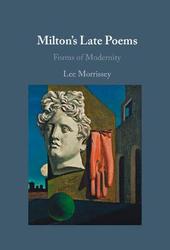
|
Milton's Late Poems: Forms of Modernity
Hardback
Main Details
| Title |
Milton's Late Poems: Forms of Modernity
|
| Authors and Contributors |
By (author) Lee Morrissey
|
| Physical Properties |
| Format:Hardback | | Pages:280 | | Dimensions(mm): Height 235,Width 158 |
|
| Category/Genre | Literature - history and criticism |
|---|
| ISBN/Barcode |
9781009197083
|
| Classifications | Dewey:821.4 |
|---|
| Audience | |
|---|
| Illustrations |
Worked examples or Exercises
|
|
Publishing Details |
| Publisher |
Cambridge University Press
|
| Imprint |
Cambridge University Press
|
| Publication Date |
25 August 2022 |
| Publication Country |
United Kingdom
|
Description
Upending conventional scholarship on Milton and modernity, Lee Morrissey recasts Paradise Lost, Paradise Regained, and Samson Agonistes as narrating three alternative responses to a world in upheaval: adjustment, avoidance and antagonism. Through incisive engagement with narrative, form, and genre, Morrissey shows how each work, considered specifically as a fiction, grapples with the vicissitudes of a modern world characterised more by paradoxes, ambiguities, subversions and shifting temporalities than by any rigid historical periodization. The interpretations made possible by this book are as invaluable as they are counterintuitive, opening new definitions and stimulating avenues of research for Milton students and specialists, as well as for those working in the broader field of early modern studies. Morrissey invites us to rethink where Milton stands in relation to the greatest products of modernity, and in particular to that most modern of genres, the novel.
Author Biography
Lee Morrissey is Alumni Distinguished Professor of English at Clemson University, USA. He is the author of The Constitution of Literature: Literacy, Democracy, and Early English Literary Criticism (2008) and From the Temple to the Castle: An Architectural History of English Literature, 1660-1760 (1999), and is a co-author of English Literature in Context (2008, rev. 2nd ed. 2017).
Reviews'Milton's Late Poems: Forms of Modernity offers shrewd and sophisticated counter-intuitive interpretations of Milton's major poems Paradise Lost, Paradise Regained, and Samson Agonistes in relation to formulations of modernity. Arguing that Milton encourages the interrogation of the theoretical categories by which modernity would be made legible, Dr. Morrissey develops provocative and adventurous analyses that cut against the grain of historicist interpretation and familiar literary narratives. Highly generative in thought, this study demonstrates how each of Milton's late poems tells a different story about what the engagement with theories of modernity makes possible. Forms of Modernity will intrigue and reward Milton scholars and scholars of modernity, while challenging those caught up in a narrative of secularization.' Elizabeth Sauer, Brock University
|